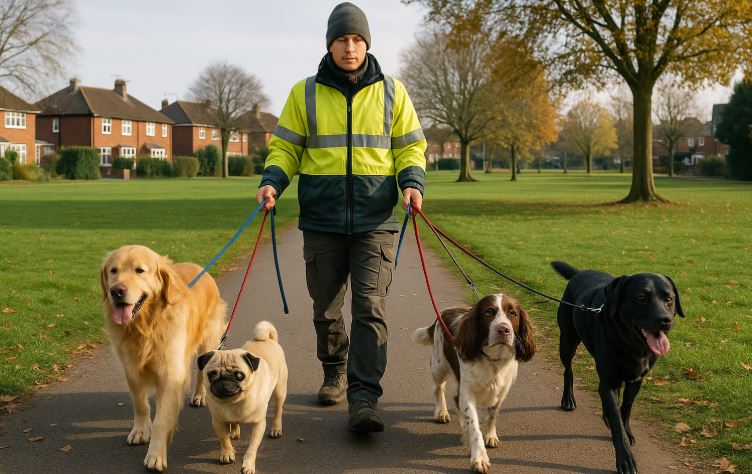Have you ever felt more relaxed during a walk with a dog than at your desk? You’re not alone. Across the UK, more people are turning their love for dogs into fulfilling careers. And it’s not just about getting fresh air anymore.
With more than 17 million dogs now living in UK households, and many pet parents working full-time, the demand for dog walkers is higher than ever.
Since the pandemic, pet ownership has surged and so has the need for reliable care. Dog walking services are no longer considered a luxury, they’re a necessity.
If you’re considering launching your own dog walking business in 2025, you’re entering a growing industry with potential to be both rewarding and profitable. This guide will take you through everything you need to know to get started, step by step.
What Is a Dog Walking Business?

A dog walking business is a professional service that offers routine walks for dogs when their owners are unavailable. Dog walkers may work independently or as part of a larger pet care business, offering services that range from 30-minute daily walks to full-day pet sitting or even dog training.
Types of Services Included
Dog walking businesses often expand to include:
- Solo or group walks
- Pet sitting or boarding
- Puppy care or elderly dog visits
- Administering medication
- Pet taxi services
These services meet the needs of modern pet owners who are juggling work, family life, and social commitments.
The Growing Market in the UK
The UK pet care sector has witnessed steady growth since 2020. Reports estimate that around £10 billion is now spent annually on pet services and accessories. This includes grooming, boarding, and walking. As lifestyles evolve and more households adopt dogs, the demand for daily, reliable dog care continues to increase.
Why Is Dog Walking in Demand in the UK?
Dog walking businesses have become increasingly important to many UK households due to changing routines and expectations of pet ownership. It’s not just about exercising a dog. It’s about fulfilling a commitment to their health and wellbeing.
Post-Pandemic Pet Parenting
During the pandemic, thousands of families brought home a new pet. But as life returned to normal, those same families began returning to work, commuting, and travelling again. Dog walking became more than a convenience, it became a solution.
Rise of the “Pet Parent”
Modern dog owners view their pets as family members. This shift in perception means owners are more likely to invest in quality care, choosing qualified walkers who can build strong, consistent bonds with their dogs.
Time Constraints and Working Patterns
With more dual-income households and unpredictable schedules, it’s difficult for many owners to maintain a consistent walking routine. This opens the door for trustworthy professionals to step in and provide essential care.
What Do You Need to Start a Dog Walking Business Legally?

Starting a dog walking business in the UK is relatively simple, but it must be done properly. Even if you’re working alone, your business needs to meet key legal and safety standards.
Registering Your Business
You must register as self-employed with HMRC. This allows you to file taxes correctly and operate as a legal sole trader. You’ll also need to track earnings and expenses through proper record keeping.
Background Checks
Many dog owners will expect a Disclosure and Barring Service (DBS) check, especially if you’re accessing their homes to collect pets. A basic check ensures you have no criminal record and increases trust with clients.
Insurance Essentials
Professional insurance is non-negotiable. It protects you and your clients in case something goes wrong. Typical coverage includes:
- Public liability insurance
- Care, custody, and control cover
- Loss of keys cover
- Equipment protection
- Employers’ liability (if hiring staff)
Common Insurance Types
| Insurance Type | Covers | Average Monthly Cost |
|---|---|---|
| Public Liability | Injuries, damages | £5.00–£10.00 |
| Key Cover | Lost client keys | £2.00–£5.00 |
| Custody & Control | Injury to pets | £6.00–£12.00 |
| Equipment Cover | Damaged or lost gear | £2.50–£7.00 |
How to Start a Dog Walking Business? – Step by Step
You may love dogs, but to succeed as a business owner, you need more than just passion. Starting small and scaling sustainably is key.
Step 1: Research Local Demand
Spend time in your neighbourhood parks, vet offices, and pet stores. Observe how many dogs are being walked. Search for competitors online and note their service prices and coverage areas.
Step 2: Build a Simple Business Plan
Outline your target clients, price list, operational hours, and expenses. Include basic marketing strategies and financial projections. This plan doesn’t have to be complex but should guide your decisions.
Step 3: Legal Setup and Insurance
Register with HMRC and choose your insurance provider. Secure a DBS check and, if required, apply for a local dog walking licence from your council.
Step 4: Define Your Services and Rates
Decide on walk durations, whether you’ll offer solo or group walks, and your hourly rate. Be transparent about what’s included and establish clear terms of service.
Step 5: Launch Your Business
Start with neighbours or friends to get testimonials. Create basic branding (logo, business cards) and a website or Facebook page. Begin posting dog updates, helpful tips, and walking schedules.
What Training or Qualifications Do Dog Walkers Need?

While the UK doesn’t mandate formal qualifications, most successful walkers invest in some form of training or certification. This increases their credibility and allows them to charge more.
Volunteering and Hands-On Experience
Before launching, consider volunteering at an animal rescue centre. It gives you experience in handling various breeds, dealing with behaviours, and managing emergencies.
Useful Qualifications
- Level 2 Certificate in Dog Walking (City & Guilds)
- Pet First Aid Certification
- Canine Behaviour & Handling Courses
- NarpsUK Pet Sitting Certification
These courses provide foundational knowledge about dog body language, emergency protocols, leash control, and more.
Why Clients Prefer Certified Walkers?
Dog owners want peace of mind. Trained walkers are seen as professionals who take their role seriously. You’ll also find that some insurers require specific certifications before issuing certain types of cover.
What UK Laws Apply to Dog Walkers?
Operating a dog walking business means taking full responsibility for the welfare and behaviour of the animals in your care. In the UK, several laws apply to professional dog walkers, and failure to follow them can result in fines or even legal action.
The Animal Welfare Act 2006
This is the cornerstone of animal protection legislation in the UK. As a dog walker, you are legally responsible for meeting the welfare needs of dogs while they’re with you. These include:
- Providing a suitable environment and diet
- Allowing for normal behaviour patterns
- Protecting them from pain, injury, and disease
Dog Fouling Regulations
Under the Anti-Social Behaviour, Crime and Policing Act 2014, it’s an offence to leave dog mess in public spaces.
Dog walkers must always clean up after the dogs they handle or risk fines of up to £1,000 in England and Wales. In Scotland, the maximum fine is £500 under the Dog Fouling (Scotland) Act 2003.
Dangerous Dogs Act 1991
You are responsible if a dog in your care injures a person or another animal. The law also makes it an offence to allow a dog to be dangerously out of control in public. You must be confident in handling different breeds and reading signs of aggression.
Control of Dogs Order 1992
Every dog must wear a collar with an identity tag showing the owner’s name and address when in public. If a dog in your care doesn’t have proper identification, you could face a fine.
UK Dog Walking Regulations
| Law | Responsibility | Penalty |
|---|---|---|
| Animal Welfare Act 2006 | Maintain dog wellbeing | Unlimited fine |
| Dog Fouling Laws | Clean up mess | £500–£1000 fine |
| Dangerous Dogs Act | Prevent aggressive incidents | Criminal charges |
| Control of Dogs Order | Ensure ID tagging | £5,000 fine |
What Should You Charge as a Dog Walker?

Knowing how to price your services fairly and competitively is vital. Your rates should reflect your experience, the number of dogs walked, walk duration, and location.
Average Rates in 2025
According to recent UK market data, dog walkers charge between £10 and £25 per walk, depending on factors such as location, time, and group size.
Income Estimator Table
| Walks Per Day | Dogs Per Walk | Rate (Avg) | Monthly Earnings (Est) |
|---|---|---|---|
| 3 | 2 | £15 | £1,800 |
| 4 | 3 | £13 | £3,120 |
| 5 | 4 | £12 | £4,800 |
What Marketing Strategies Work?
A great service isn’t enough. Marketing helps you stand out, build trust, and secure repeat clients.
Online Strategies
- Build a mobile-friendly website
- Set up a Google Business Profile
- Use Facebook and Instagram to post daily updates
- Share tips and videos to increase engagement
Offline Strategies
- Use flyers in local cafés, pet stores, and vets
- Wear branded clothing while walking
- Offer referral discounts to current clients
What Equipment Do You Need?
While startup costs are low, you need basic equipment to operate safely and professionally.
Essential Gear
- Leads and harnesses
- Dog waste bags
- First aid kit
- Hi-vis outerwear
- Water bottles and treats
Equipment Cost
| Item | Average Cost |
|---|---|
| Hi-vis jacket | £20–£40 |
| Leads/harnesses | £25–£60 |
| First aid kit | £15–£30 |
| Walk tracking app | Free–£20/month |
What Insurance Is Required?

Insurance protects your clients, their pets, and your business from financial risk.
Types to Consider
- Public Liability Insurance
- Care, Custody and Control
- Loss of Keys Cover
- Employers’ Liability Insurance (if hiring)
Comparison Table: Insurance Policies
| Cover Type | Purpose | Required for |
|---|---|---|
| Public Liability | Accidents and damage | All dog walkers |
| Custody & Control | Injury to pets | Multi-pet walks |
| Employers’ Liability | Staff protection | Businesses with employees |
| Loss of Keys | Replacing lost keys | Home visits |
Conclusion
If you love animals, enjoy flexible work, and are happy spending time outdoors, starting a dog walking business might be one of the most fulfilling career decisions you make.
The market is growing, the barriers to entry are low, and the personal satisfaction of working with dogs is hard to beat.
By investing in training, setting clear boundaries, and delivering excellent service, you can build a dog walking business that stands out, one wagging tail at a time.
Frequently Asked Questions
How many dogs can you walk at once in the UK?
Typically up to 4–6 dogs, depending on local council regulations.
Do I need a licence to walk dogs professionally?
Yes, in some local councils, especially for commercial use of public parks.
What insurance is mandatory for dog walkers?
Public liability insurance is the most essential.
How do I advertise my dog walking business locally?
Use flyers, social media, Google profiles, and word of mouth.
Can I start a dog walking business part-time?
Yes, many start part-time and scale up as they grow.
What should I do if a dog gets injured during a walk?
Apply pet first aid, inform the owner immediately, and seek vet help if needed.
How do I compete with other dog walkers in my area?
Offer reliable service, flexible packages, and good customer care.

Leave a Reply